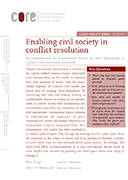Despite international interventions, a solution to the Cyprus conflict remains elusive, particularly since national elites use the conflict to maintain their own positions of power. Only the peace-related segment of Cyprus’s civil society has found ways of escaping ethnonationalism. By prioritizing elite talks and linking funding to conditionality, donors are losing out on opportunities to achieve society-wide mobilization and reconciliation away from the limitations of elite-level negotiations. International donors continue to underestimate the importance of peace-orientated civil society and instead attempt to institutionalize, co-opt or marginalize them. As a consequence, civil society has been confined to an isolated political space. Only through the moving of such a ‘peace space’ from the periphery to the centre of society will it be possible to facilitate a locally-accepted rather than an internationally-driven peace process. Accordingly, this policy brief offers recommendations as to how international donors could be more helpful than harmful by guarding the ‘third space’ rather than trying to manage it.
Vogel, Birte & Oliver P. Richmond (2013) Enabling civil society in conflict resolution, CORE Policy Brief, 2. Oslo: PRIO.







